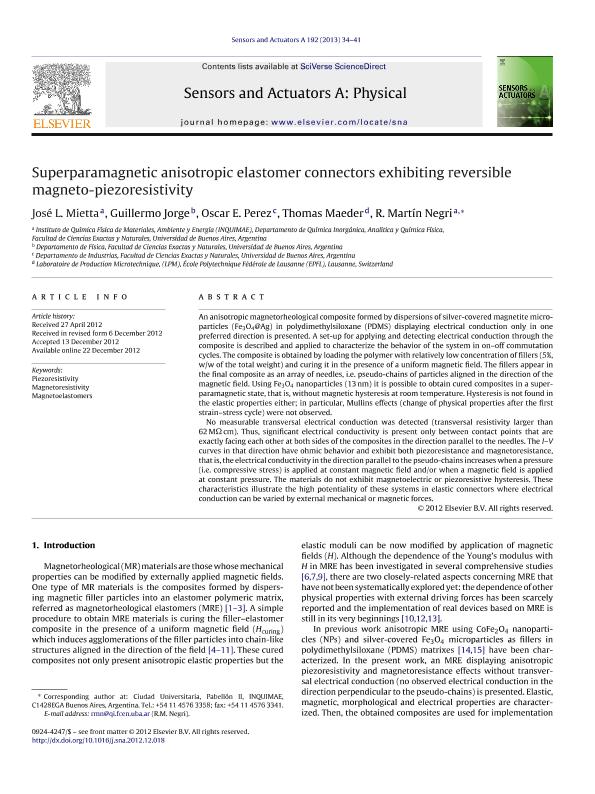Mostrar el registro sencillo del ítem
dc.contributor.author
Mietta, Jose L.
dc.contributor.author
Jorge, Guillermo Antonio

dc.contributor.author
Perez, Oscar Edgardo

dc.contributor.author
Maeder, Thomas
dc.contributor.author
Negri, Ricardo Martin

dc.date.available
2016-11-01T14:53:21Z
dc.date.issued
2012-12-22
dc.identifier.citation
Mietta, Jose L.; Jorge, Guillermo Antonio; Perez, Oscar Edgardo; Maeder, Thomas; Negri, Ricardo Martin; Superparamagnetic anisotropic elastomer connectors exhibiting reversible magneto-piezoresistivity; Elsevier; Sensors And Actuators A: Physical; 192; 22-12-2012; 34-41
dc.identifier.issn
0924-4247
dc.identifier.uri
http://hdl.handle.net/11336/7888
dc.description.abstract
An anisotropic magnetorheological composite formed by dispersions of silver-covered magnetite microparticles(Fe3O4@Ag) in polydimethylsiloxane (PDMS) displaying electrical conduction only in one preferred direction is presented. A set-up for applying and detecting electrical conduction through the composite is described and applied to characterize the behavior of the system in on-off commutation cycles. The composite is obtained by loading the polymer with relatively low concentration of fillers (5%,w/w of the total weight) and curing it in the presence of a uniform magnetic field. The fillers appear in the final composite as an array of needles, i.e. pseudo-chains of particles aligned in the direction of the magnetic field. Using Fe3O4 nanoparticles (13 nm) it is possible to obtain cured composites in a superparamagnetic state, that is, without magnetic hysteresis at room temperature. Hysteresis is not found in the elastic properties either; in particular, Mullins effects (change of physical properties after the first strain-stress cycle) were not observed. No measurable transversal electrical conduction was detected (transversal resistivity larger than 62 M cm). Thus, significant electrical conductivity is present only between contact points that are exactly facing each other at both sides of the composites in the direction parallel to the needles. The I-V curves in that direction have ohmic behavior and exhibit both piezoresistance and magnetoresistance, that is, the electrical conductivity in the direction parallel to the pseudo-chains increases when a pressure (i.e. compressive stress) is applied at constant magnetic field and/or when a magnetic field is applied at constant pressure. The materials do not exhibit magnetoelectric or piezoresistive hysteresis. These characteristics illustrate the high potentiality of these systems in elastic connectors where electrical conduction can be varied by external mechanical or magnetic forces.
dc.format
application/pdf
dc.language.iso
eng
dc.publisher
Elsevier

dc.rights
info:eu-repo/semantics/openAccess
dc.rights.uri
https://creativecommons.org/licenses/by-nc-nd/2.5/ar/
dc.subject
Sensors
dc.subject
Magnetoelastomers
dc.subject
Magnetoresistivity
dc.subject
Piezoresistivity
dc.subject.classification
Físico-Química, Ciencia de los Polímeros, Electroquímica

dc.subject.classification
Ciencias Químicas

dc.subject.classification
CIENCIAS NATURALES Y EXACTAS

dc.title
Superparamagnetic anisotropic elastomer connectors exhibiting reversible magneto-piezoresistivity
dc.type
info:eu-repo/semantics/article
dc.type
info:ar-repo/semantics/artículo
dc.type
info:eu-repo/semantics/publishedVersion
dc.date.updated
2016-10-26T21:21:00Z
dc.journal.volume
192
dc.journal.pagination
34-41
dc.journal.pais
Países Bajos

dc.journal.ciudad
Amsterdam
dc.description.fil
Fil: Mietta, Jose L.. Consejo Nacional de Investigaciones Científicas y Técnicas. Oficina de Coordinación Administrativa Ciudad Universitaria. Instituto de Química, Física de los Materiales, Medioambiente y Energía; Argentina. Universidad de Buenos Aires; Argentina
dc.description.fil
Fil: Jorge, Guillermo Antonio. Consejo Nacional de Investigaciones Científicas y Técnicas. Oficina de Coordinación Administrativa Ciudad Universitaria. Instituto de Química, Física de los Materiales, Medioambiente y Energía; Argentina. Universidad de Buenos Aires; Argentina
dc.description.fil
Fil: Perez, Oscar Edgardo. Consejo Nacional de Investigaciones Científicas y Técnicas. Oficina de Coordinación Administrativa Ciudad Universitaria. Instituto de Química Biológica de la Facultad de Ciencias Exactas y Naturales; Argentina. Universidad de Buenos Aires; Argentina
dc.description.fil
Fil: Maeder, Thomas. Ecole Polytechnique Federale de Lausanne; Suiza
dc.description.fil
Fil: Negri, Ricardo Martin. Consejo Nacional de Investigaciones Científicas y Técnicas. Oficina de Coordinación Administrativa Ciudad Universitaria. Instituto de Química, Física de los Materiales, Medioambiente y Energía; Argentina. Universidad de Buenos Aires; Argentina
dc.journal.title
Sensors And Actuators A: Physical

dc.relation.alternativeid
info:eu-repo/semantics/altIdentifier/doi/http://dx.doi.org/10.1016/j.sna.2012.12.018
dc.relation.alternativeid
info:eu-repo/semantics/altIdentifier/url/http://www.sciencedirect.com/science/article/pii/S0924424712007558
Archivos asociados
